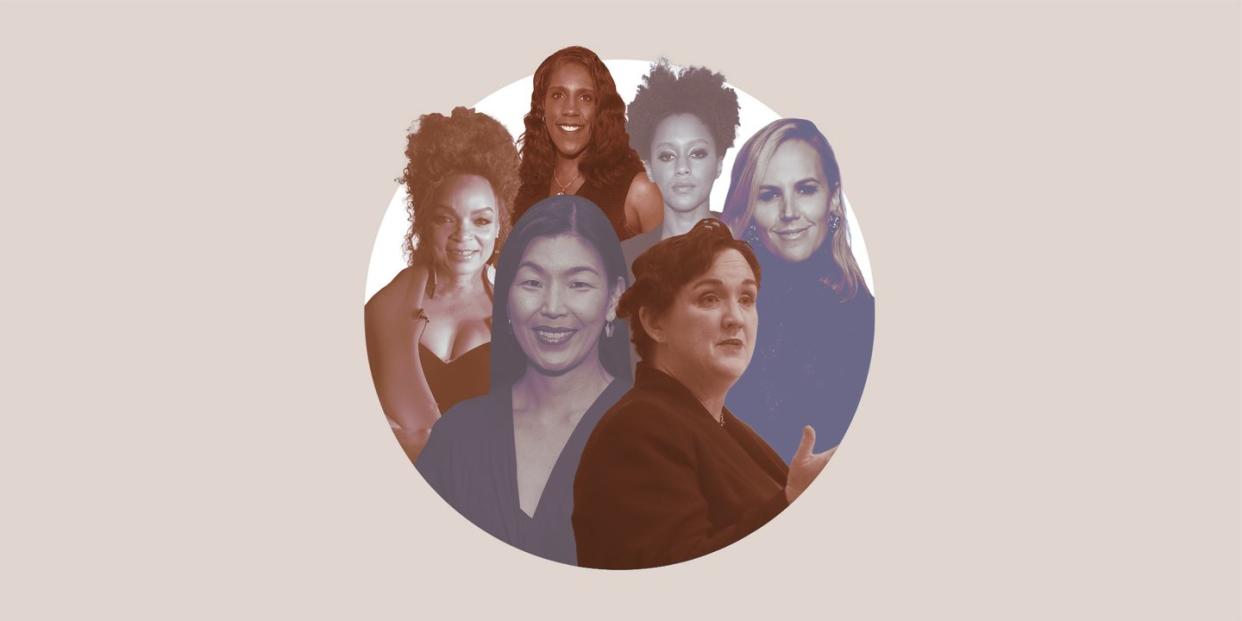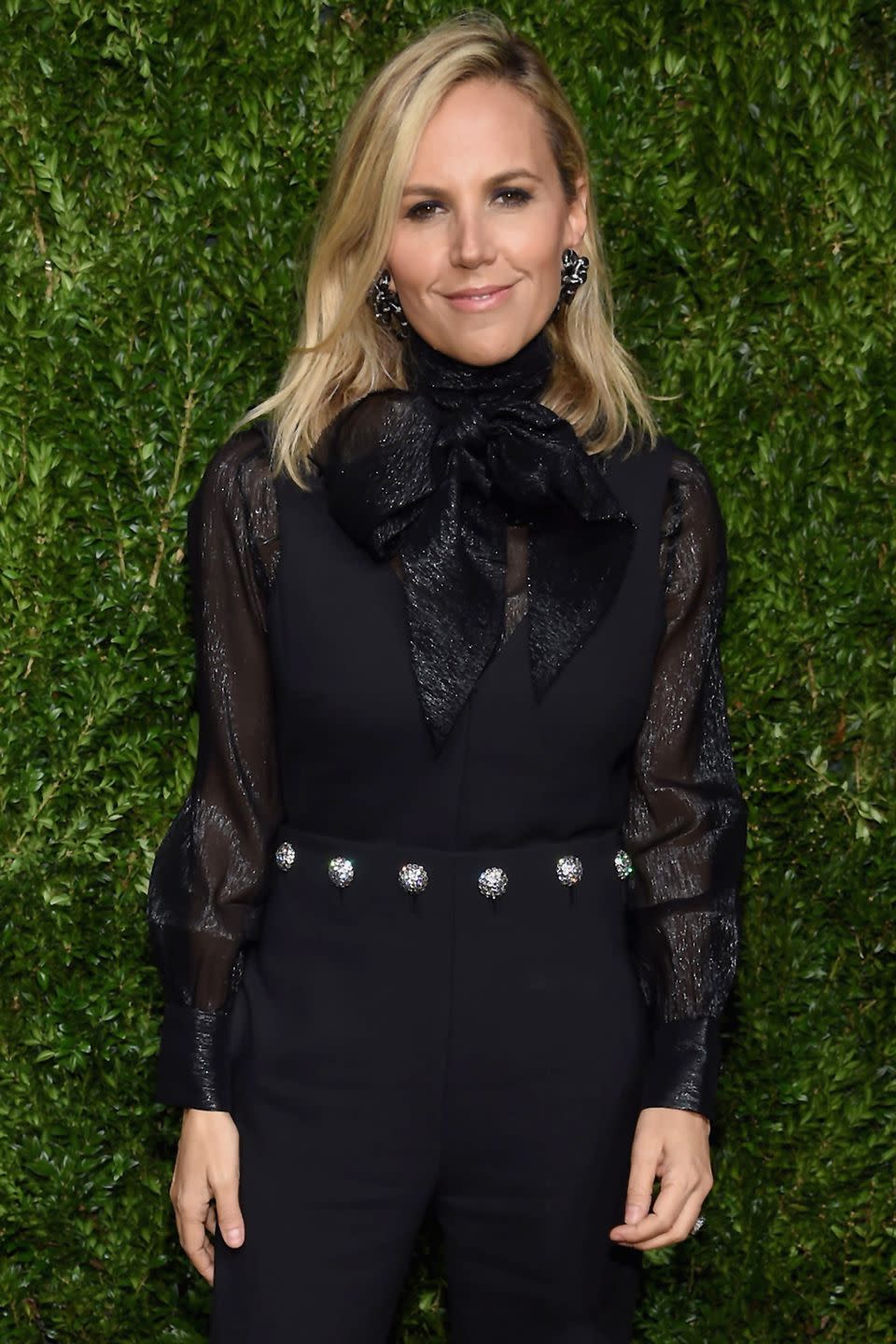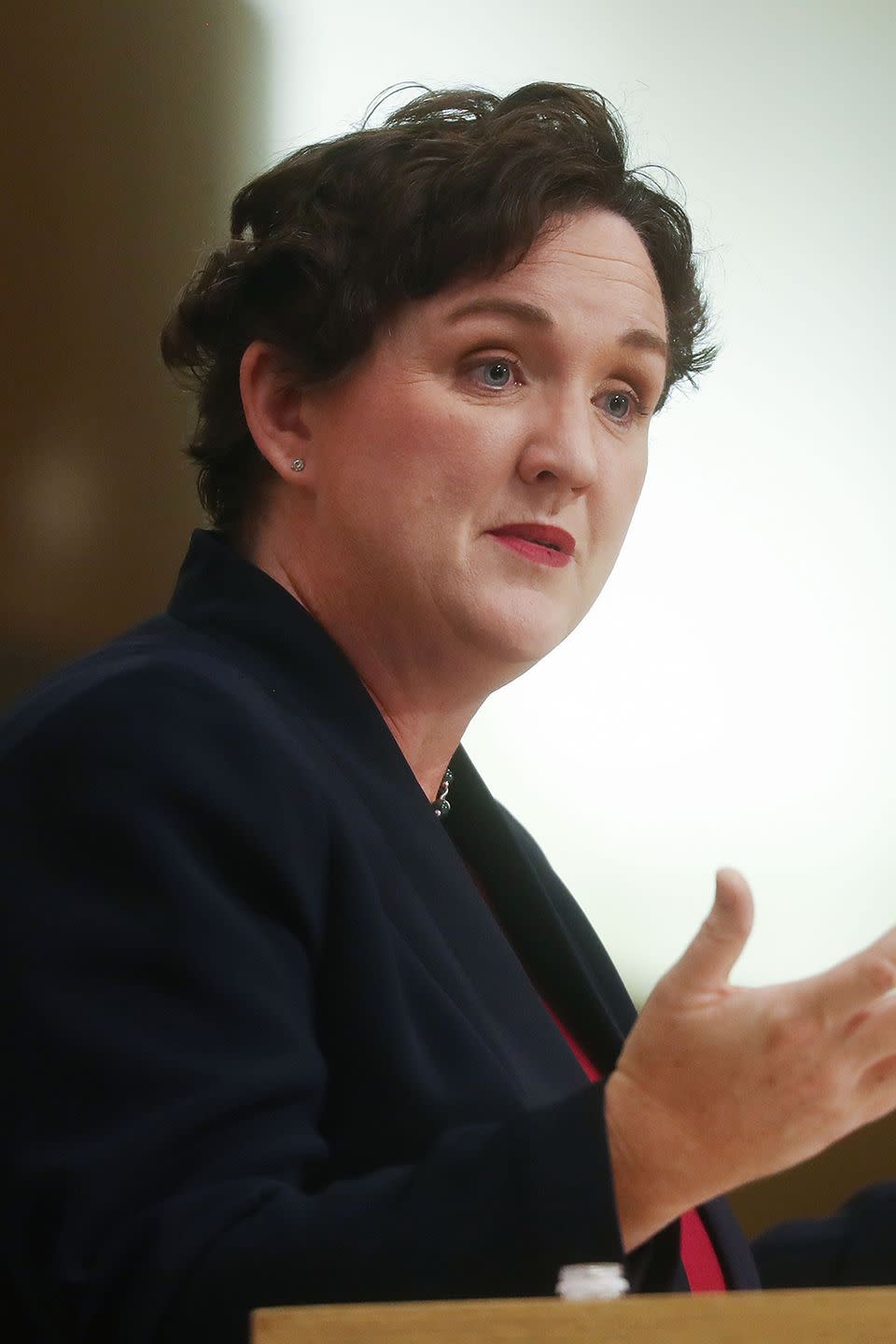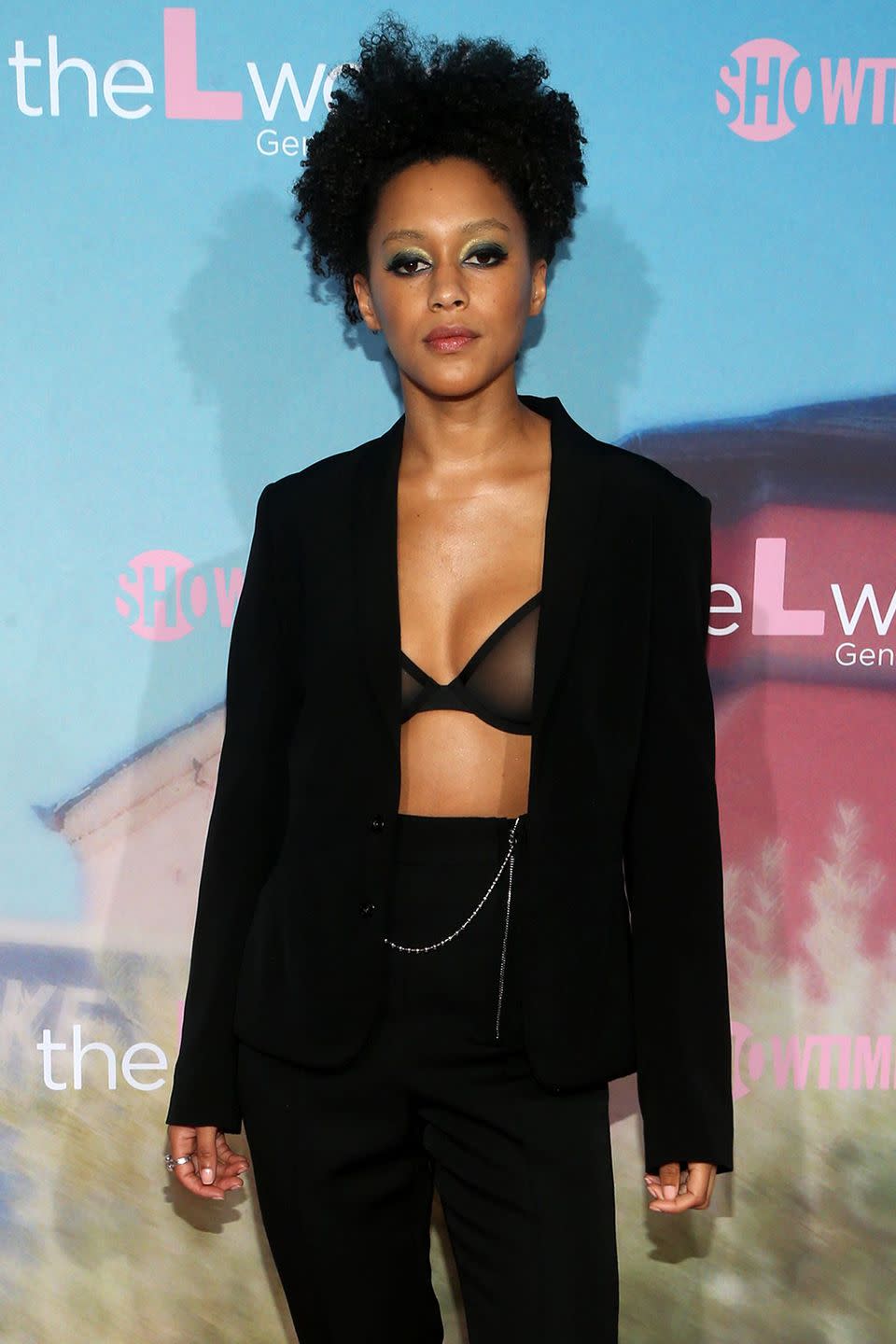Tory Burch, Ruth E. Carter, Katie Porter and More on What They've Learned From Their Mentors

- Oops!Something went wrong.Please try again later.
- Oops!Something went wrong.Please try again later.
Looking to get promoted? Get a mentor. According to Forbes, women with professional guides are five times more likely to advance in their workplaces, but the benefits go both ways: Female mentors report better job satisfaction and performance for themselves too. That’s why this Women's History Month, Harper’s BAZAAR approached leaders in style, art, science, and politics to share the lessons they’ve learned from their own mentors—some famous, some family—along with the advice they impart on the next generation of powerful women preparing to lead. (And, yes, that includes you.)
Tory Burch, Founder, Executive Chairman, and Chief Creative Officer of Tory Burch LLC

Ambition is not a trend, but Tory Burch keeps transforming empowered women into style icons—starting with herself. Burch was a BAZAAR assistant before working for another female visionary, Vera Wang, and also Ralph Lauren; she created her eponymous label in 2004 and within a year, Oprah Winfrey was interviewing her about its wild success. But though Burch’s ultimate role model “in business and in life” is her mother, Reva Robinson, the University of Pennsylvania alumna says, “Some of my greatest teachers are people I have never met,” including stateswomen like Eleanor Roosevelt and former European Parliament president Simone Veil, along with the late civil rights icon John Edwards. She’s also spoken about the impact of former Google CEO Eric Schmidt, who serves on her advisory board, and how she’s learned “the importance of repetition and messaging” from the mogul.
Today, Burch leads more than 2,000 employees—about 80 percent of them women—who have helped “teach [her] the kind of leader I want to be, and the importance of creating a strong and inclusive culture.” She also helms a namesake foundation with the tagline #EmbraceAmbition, which has been ’grammed nearly 40,000 times. (Thank celebrity voices like Kerry Washington, Reese Witherspoon, and Billie Jean King for the signal boost.) But although Burch insists that speaking up and owning your ideas are crucial for success, she believes that introverts often make the best mentors and leaders, saying, “In my experience, introverts can be incredibly deep thinkers and often bring the most powerful insights [to a meeting].” She also stresses the power of listening to one’s peers and colleagues, noting, “My grandmother used to say, ‘You never learn anything with your mouth open.’” One thing Burch continues to learn? How fashion collections and leadership roles overlap in her own life. “There are skills that apply to both,” she says. “You need to be able to communicate a clear vision, inspire your team, and be agile enough to navigate a constantly changing world.”
Currently, Burch is one of the very few female creative forces helming a billion-dollar lifestyle brand—Ann-Sofie Johansson at H&M is another—but she says rooting for more women to take powerful positions is a key facet for future success, even when we haven’t yet gotten our own dream jobs. “Each of our dreams and ambition is bigger than any particular opportunity,” she says. “If another woman gets a position you wanted, I would be gracious and know that everything happens for a reason. There is always another opportunity around the corner.”
That opportunity includes an #EmpoweredWomen partnership, which launched on International Women’s Day between the Tory Burch Foundation and Upworthy, the human rights media platform. “I have been so moved by how women have stepped up, despite the challenges of the past year, and wanted to share some positive news and inspiration,” Burch says. To that end, they’re giving $5,000 to one woman each month to donate to a nonprofit of her choice, because for Burch, “paying it forward” is a literal mission.
Katie Porter, U.S. Representative, California’s 45th Congressional District

If you’ve gotten a free COVID-19 test this year, thank Katie Porter. The first Democrat to represent California’s 45th District (a.k.a. Orange County), Porter argued successfully for the measure in March 2020; she also famously schooled Wall Street CEOs live on C-SPAN. Who showed her the ropes? None other than Elizabeth Warren.
“She showed me I couldn’t just communicate with ideas,” says Porter from her Golden State office. “I had to communicate with people, whether that meant asking tough questions at hearings, speaking up in interviews, or engaging with people one-on-one in my district. With every piece of legislation, you have to show people what’s really at stake and what you’re doing to help them.”
The mentorship began when Porter was Warren’s research assistant while studying economic policy at Harvard Law School. “She showed great confidence in me,” Porter shares, “and when I didn’t get something right, she didn’t say, ‘Never mind, I’ll do it myself.’ That would have been faster and easier for her, but instead, she would say, ‘This is what you did wrong. Now go make it right.’ … She didn’t give up on people. She believed in people even if they didn’t yet know they could do something. And that kind of confidence in someone, believing someone will become great at something with practice and guidance, is an incredible quality in a mentor.”
Porter credits that belief in her tenacity with her first big win as a congresswoman. “I had to give a one-minute speech on a bill to make it easier for working parents to run for office … but it was my first time speaking in the House. … I went completely over time—I got gaveled down! I didn’t get to my main point!” she laughs. “But I knew I couldn’t give up. … I went back to my office and practiced making my point in 60 seconds or less. I got back on the floor, and I did it.”
When it comes to advising the next generation of female leaders, Porter says being a strong mentor includes talking about failure as well as success. “There have been times in my career when I swung and I missed,” she says. “When one door closes, one opportunity is lost. … Elizabeth would tell me, ‘Don’t dwell on the closed door. Don’t let the closing door reverberate or you won’t hear the doors opening.’ And that’s very powerful to me.”
Porter says that right now, the advice she’s asked most often is how she’s managing her demanding career while being a single mom, especially in the midst of COVID. “I’ve been getting a lot of questions from women like, ‘How do you do this?!’ And when I was younger, I thought work-life balance was like the scales of justice, except one is work and one is family. That is dead wrong! Work-life balance is like riding a bike. It’s active. You lean one way; you lean the other way. The terrain changes, but you keep peddling forward.”
Ruth E. Carter, Oscar Award-Winning Costume Designer

Ruth E. Carter’s current project is designing for the masses—as in, thousands of movie extras in Atlanta, where she also worked with superstars like Eddie Murphy and Leslie Jones on Coming 2 America. “Those huge scenes take a special level of focus,” says the Massachusetts native, who scored an Academy Award for her work on Black Panther. “And you need to rely on your leadership skills and your team, because it’s possible you can find yourself in a bad and dark spot.” Carter doesn’t mean this as a metaphor—she means an actual dark spot: “Often on film sets, you’re working without the best light! You can’t see that well, you can’t hear that well. It’s backbreaking work sometimes, and you need to be honest with your team about what you want or need, and that includes a break.”
Carter credits her candor and communication with keeping everyone sane on set, whether it’s the wardrobe assistants, whom she mentors, or the rising stars like KiKi Layne, who receive their own kind of guidance and leadership from Carter. “Sometimes, they’ll come into a costume fitting with their own stylist,” she sighs, “because they’ve had a really horrible experience out there with another costume designer, and they’ve been made to feel uncomfortable and like nothing they were wearing was right. So I’m really patient with them, and I tell them it’s a wide-open door in terms of communication. I want them to have a good experience. I’m very patient, and I always try to listen. But I think the worst thing that you can do as a costume designer is have the actor come into the room, and say to them, ‘Okay, so what do you want?’ That’s just a road to nowhere! … So I always try to be prepared [with several looks], because ultimately, I have to be the one to lead that part of the [filmmaking] process.”
But Carter didn’t know the “absolute magic” of film design until two mentors—director Spike Lee and casting maven Robi Reed—came to see a dance troupe that Carter had styled in the ’80s. “I had been doing Uncle Vanya by Anton Chekhov and Shakespearean shows like The Tempest. I wanted to do opera! The film world, to me, was so far away from all that. But I signed up for a USC film, because Robi and Spike had encouraged me. I figured, ‘You can always learn more.’ And I showed up at work and heard “quiet on the set” and “cut” for the first time. The whole film was about two people sitting on a porch swing. It was so intimate. I realized I loved the process. I loved these people. I thought, I know how to do this. And shortly after that, Spike Lee called me early one morning and said, ‘This is the man of your dreams.’ And it was the late ’80s, so I said, ‘Oh, my gosh, Denzel?!’” she laughs. “It was not Denzel. But it did get me my first studio job, on School Daze.”
More than three decades later, Carter became the first Black costume designer—and the second costume designer ever, after silver screen legend Edith Head—to get a star on the Hollywood Walk of Fame. “Angela Bassett is five stars down!” she says. “So I’d say I’m in a very good place.”
Ai-Jen Poo, Director of National Domestic Workers Alliance and Caring Across Generations

Labor activist Ai-jen Poo just turned 47. “Does that mean I’m an elder now?” she laughs. “Am I one of the Wise Ones?!”
Well, pretty much. The daughter of Taiwanese immigrants has been a social justice leader since the ’90s, when she occupied a Columbia University library to protest the school’s whitewashed history program. (The now-legendary student uprising led to the creation of Columbia’s Center for the Study of Ethnicity and Race.) Soon after, Poo was a “baby activist” at a feminist conference in Manhattan when she met Linda Burnham, the Nobel Peace Prize nominee who created the Women of Color Resource Center. “She was talking about the upcoming Beijing Women’s Conference and how important it was that low-income women and women of color were part of the delegation. She wanted the U.N. to understand that American women are incredibly diverse and on the forefront of so many global issues. And I was so inspired, I basically ran up to her and said, ‘Hi, will you be my mentor?!’”
Burnham taught the future MacArthur Genius Grant winner “about the importance of data. She knew women of color and low-income women felt invisible, so she collected data that never existed before to tell the stories that need to be told. Through her, I learned the importance of listening to others, but also telling others—sometimes multiple times—their experiences are valuable.”
That includes the new group of “baby activists” coming to Poo for guidance today. “Coming into your voice and your power is so exciting,” she says, “but also, when you’re new and fired up, you have a lot of energy, but not years of organizing experience. Linda offered me so much grace, so much patience. And she taught me that you have to meet people where they are and honor that people know what they know. I think a lot about how now that I’m older, I need to offer the grace that Linda showed me to members of my own team. But I also need to make sure they understand the legacy of the women who came before us.”
Poo adds, “When Linda was coming up, women of color wasn’t even a term. When I was coming up, I was often the only woman of color in so many rooms. I felt like I had to represent so many others and hold space for so many others. I was constantly second-guessing myself. Now that I’m a leader and a mentor myself, I want to set the tone that right from the beginning, it’s assumed you’re powerful and valuable. The starting point is never having to prove yourself. The significance of what you have to say or what you’ve experienced is never in question. Linda made sure I felt that way with her. Now it’s my turn to make sure everyone who comes to the Domestic Workers Alliance feels that way too.”
Teresa C. Younger, President and CEO, Ms. Foundation for Women

It all started with Thin Mints. “I was a Girl Scout,” says Ms. Foundation head Teresa C. Younger, “so from a very young age, women were introduced to me as my leaders and guides, but not often women of color. I think when you look for a professional mentor, you want someone to show you how to leverage leadership and power. Someone who really showed me that was Marcia Gillespie, who was the editor in chief of Essence and Ms. magazine when we met. She really showed me a positioning of how to hold your own space. How to be direct. How to speak a truth in the situations you’re in and still be generous in that space. I would also mention Betty Gallo, who taught me a lot about leadership and how to advocate effectively. Betty was one of the first female advocates in the state of Connecticut,” where Younger served as the executive director of the state’s ACLU—the first woman ever to hold the post. “As a woman maneuvering in a male space, your integrity is so important. What your word means is so important. And that’s how you move legislation—through trust and through showing people that you’re working hard for them.”
For Younger, that work currently includes a $100 million initiative for female economic opportunity in the wake of COVID-19, which is coming together on Zoom instead of in the boardroom. “Nobody could have told us what leadership looks like right now, particularly in the feminist space,” she says. “And nobody can tell women to leave their personal lives at home, because there’s no other place we can be right now! So I try to lead with honesty and openness. I’ll tell my team, ‘I’ve had a rough week. I haven’t left my apartment today.’ Part of leadership is setting the pace for your team, and the other part is giving people the space they need, which is something that’s become even clearer to me now.”
Younger is passing along that clarity to a new generation of women, with a special focus on those looking to change their fields mid-career. (Younger herself has been a youth counselor, a political advocate, a grassroots organizer, and a corporate philanthropy consultant, so she knows her pivots well.) “Hearing other people’s stories affirms your own,” she explains, “and people are so afraid of veering from just one career path or just one life goal! But I always say, ‘You are the expert of your life and of the story you’re trying to tell in the world. Be honest about what that story is.’ Transferring fields as an experienced worker—it’s not the safest way to go, but it’s a strategic move. I tell my mentees, ‘You know who you are. You know your strengths. Don’t get stuck because of fear.’ Because sometimes as a mentor, you have to give [your mentees] that permission to know themselves and to do what’s right for themselves, not anybody else.”
Quinn Wilson, Creative Director for Lizzo

When one of pop’s biggest stars is your boss, it’s easy to assume that the relationship flows only one way. But makeup artist-turned-creative director Quinn Wilson insists that inside the Lizzo-verse, mentorship and inspiration bounce across the room like light from a disco ball. “Your teammates and peers can absolutely be your mentors,” says the Minnesota native. “Being on set can be life changing [for learning], and 100 percent of the time, it’s because of women you’re working with,” whether it’s musicians like Katy Perry or actresses like Indya Moore, with whom Wilson collaborated on the new short film for Billie that launches this week. (“It was inspired by the idea that there’s no such thing as female perfection. … We know this, but we still face these unattainable standards! The reality that every woman is a woman and that each representation is equally valid.”)
A graduate of the Minneapolis College of Art and Design, Wilson began her career as a makeup artist—stemming from her early love of painting—before studying with graphic design mentors like Kindra Murphy and pushing her work into video and performance. And along with LGBTQ+ luminaries like Ru Paul and King Princess, Wilson takes special note of advice from her family. “Oftentimes, we look towards public figures for idealistic inspiration, but I’ve found myself looking inward to better understand my own abilities,” she explains. “Recently, I’ve been thinking about my grandma. Her ability to [succeed] in a time of extreme racism and supremacy against women pushes me into a better understanding of what my power is.”
Today, Wilson is using that power to challenge and redefine the way pop culture sees womanhood, whether it’s through Lizzo’s joy-packed iconography or Billie’s female-created cosmetics and toiletries. But it’s her process behind the camera that’s letting her lead the next generation of creative empowerment, and she says that at work, her favorite words are you got this. “My style of leadership has to do with overestimating those around me. They need to know that I know they got this!” she adds.
The 28-year-old also takes care to impart real-world advice to students and fans asking for advice, and notes her most popular question is, “How do you become a director?” Her answer: “I began as a makeup artist, and in some way, I imagined that leading to directing. The reality was that through one medium, I learned about my love for learning. I began to acquire skills in other art departments. Finally, I realized that my truest potential had always been in the field of direction. I’m so proud of my path, however strange it may have been. I stand by the fact that there is no one way to begin a career in art!”
You Might Also Like

